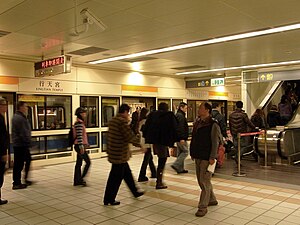Xingtian Temple metro station
| Taipei metro station | ||||||||||||||||
 Platform | ||||||||||||||||
| Chinese name | ||||||||||||||||
| Traditional Chinese | 行天宮 | |||||||||||||||
| ||||||||||||||||
| General information | ||||||||||||||||
| Location | B1F 316 Songjiang Rd Zhongshan District, Taipei Taiwan | |||||||||||||||
| Coordinates | 25°03′35″N 121°32′00″E / 25.0597°N 121.5332°ECoordinates: 25°03′35″N 121°32′00″E / 25.0597°N 121.5332°E | |||||||||||||||
| Line(s) | ||||||||||||||||
| Construction | ||||||||||||||||
| Structure type | Underground | |||||||||||||||
| Bicycle facilities | Access available | |||||||||||||||
| Other information | ||||||||||||||||
| Station code | O09, SB03 | |||||||||||||||
| Website | web | |||||||||||||||
| History | ||||||||||||||||
| Opened | 2010-11-03[1] | |||||||||||||||
| Passengers | ||||||||||||||||
| 2017 | 19.061 million per year[2] | |||||||||||||||
| Rank | (Ranked 24th of 109) | |||||||||||||||
| Services | ||||||||||||||||
| ||||||||||||||||
Xingtian Temple (Chinese: 行天宮; pinyin: Xíngtiān Gōng) is a metro station in Taipei, Taiwan served by Taipei Metro. The station opened on 3 November 2010. This station is named after the Xingtian Temple, but others include the Xingtian Temple Market and Songjiang Market are also notable. The station will be a planned transfer for the Minsheng–Xizhi line.
Station overview[]
This three-level, underground station has an island platform and has four exits.[3][4] It is located beneath the intersection of Minsheng East Rd. and Jinzhou Street, and opened on 3 November 2010 with the opening of the Luzhou Branch Line and the Taipei City section of the Xinzhuang Line.[5][6] The station serves over 15,000 passengers per day and is the busiest station on the Xinzhuang Line.[7]
Construction[]
Excavation depth for this station is around 25 meters. It is 157 meters in length and 25 meters wide. It has four entrances, one accessibility elevator, and two vent shafts.[5] Three of the entrances are integrated with joint development buildings, while the other is connected with an existing sidewalk. Following Dapinglin, Xingtian Temple is only the second station to have three joint development sites.[8] The station is equipped with platform screen doors.
Station layout[]
| Street Level | Entrance/Exit | Entrance/Exit |
| B1 | Concourse | Lobby, information desk, ticket machines, one-way faregates |
| Restrooms (Inside fare zone, outside fare zone near Exit 1) | ||
| B3 | Platform 1 | ← |
| Island platform, doors will open on the left | ||
| Platform 2 | → | |
Exits[]
The station has four exits.
Around the station[]
- Xingtian Temple
- Broadcasting Corporation of China Songjiang Building
- Zhongshan District Administrative Center
- Songjiang Market
- The Inn of the Sixth Happiness (between this station and Songjiang Nanjing Station)
- Taipei Municipal Datong High School
- Central News Agency
- Evergreen Marine Corporation Building
- Evergreen Chinese Medicine Clinic
Public Art[]
Taking into account the nearby Xingtian Temple, the station has the "Eight Generals" (八家將; bajiajiang) masks and tiles as public art displays. Due to the anticipated passenger traffic through the station, the art displays were constructed out of ceramics for easier maintenance and protection from accidents.[9]
References[]
| Wikimedia Commons has media related to Xingtian Temple Station. |
- ^ "Chronicles". Taipei Metro. 5 December 2013. Retrieved 10 October 2018.
- ^ "臺北市交通統計查詢系統". dotstat.taipei.gov.tw (in Chinese). Retrieved 15 September 2018.
- ^ "Xingtian Temple Station". Taipei Rapid Transit Corporation. Retrieved 2010-11-03.
- ^ "新莊線行天宮站". Department of Rapid Transit Systems. 2005-07-01. Retrieved 2011-05-15.
- ^ a b "Introduction to Xinzhuang MRT Line" (PDF). Department of Rapid Transis Systems. 2008-03-01. Retrieved 2010-06-18.
- ^ "Second Stage of Taipei MRT (Approved MRT Lines)". Department of Rapid Transit Systems, TCG. 2010-03-12. Retrieved 2010-06-18.
- ^ "北捷蘆洲線運量 突破百萬人次". UDN. 2010-11-15. Retrieved 2010-11-18.
- ^ "新莊線行天宮站聯合開發". Department of Rapid Transit Systems. 2005-07-01. Retrieved 2010-06-18.
- ^ 郭書宏 (2010-07-08). "八家將 跳進捷運行天宮站". 人間福報. Retrieved 2010-07-07.
- Zhonghe–Xinlu line stations
- Railway stations opened in 2010
- Taiwan rapid transit stubs
